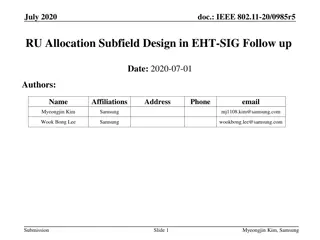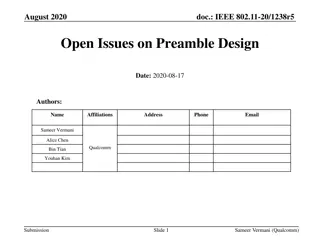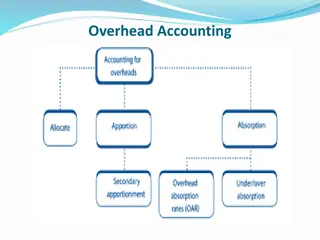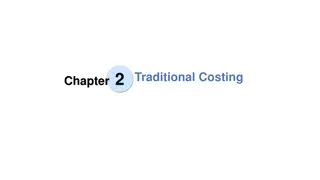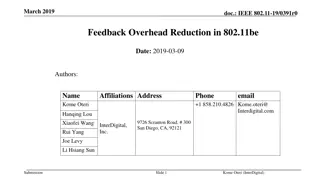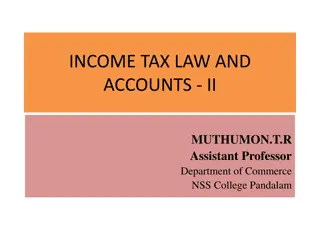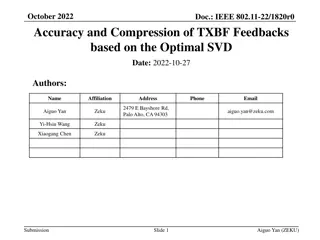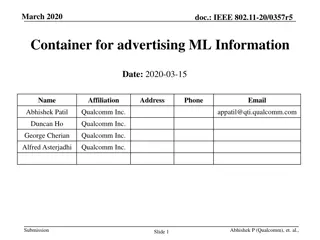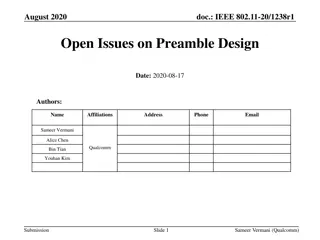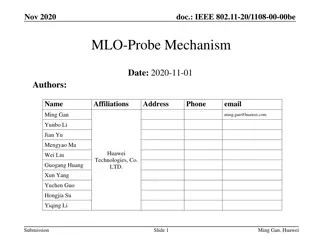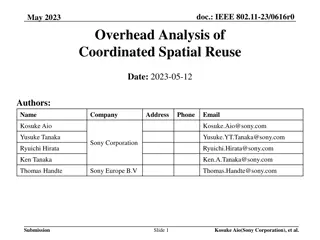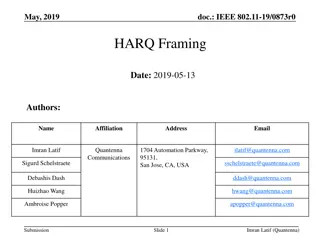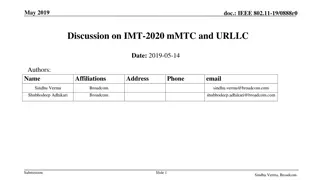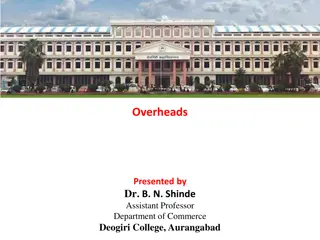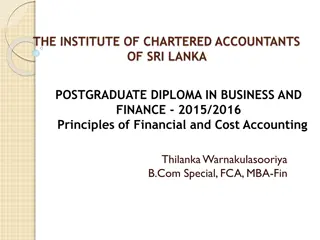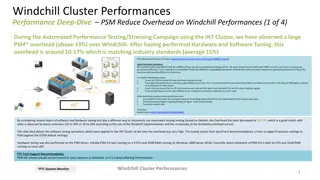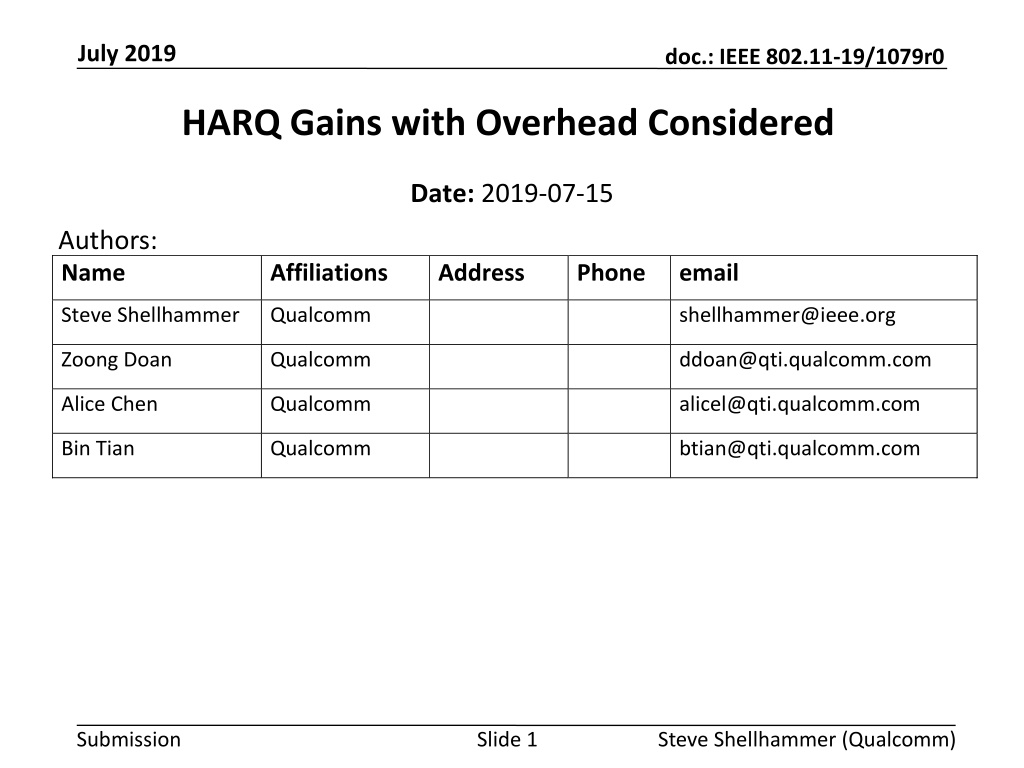
Investigating HARQ Gains in IEEE 802.11-19/1079r0 Document
Delve into the throughput gains of HARQ compared to ARQ in IEEE 802.11-19/1079r0 document analyzing spectral efficiency and overhead considerations.
Download Presentation

Please find below an Image/Link to download the presentation.
The content on the website is provided AS IS for your information and personal use only. It may not be sold, licensed, or shared on other websites without obtaining consent from the author. If you encounter any issues during the download, it is possible that the publisher has removed the file from their server.
You are allowed to download the files provided on this website for personal or commercial use, subject to the condition that they are used lawfully. All files are the property of their respective owners.
The content on the website is provided AS IS for your information and personal use only. It may not be sold, licensed, or shared on other websites without obtaining consent from the author.
E N D
Presentation Transcript
July 2019 doc.: IEEE 802.11-19/1079r0 HARQ Gains with Overhead Considered Date: 2019-07-15 Authors: Name Affiliations Address Phone email Steve Shellhammer Qualcomm shellhammer@ieee.org Zoong Doan Qualcomm ddoan@qti.qualcomm.com Alice Chen Qualcomm alicel@qti.qualcomm.com Bin Tian Qualcomm btian@qti.qualcomm.com Submission Slide 1 Steve Shellhammer (Qualcomm)
July 2019 doc.: IEEE 802.11-19/1079r0 Presentation Outline 1. Introduction 2. HARQ Spectral Efficiency Gain Definition 3. Overhead Analysis Overview 4. HARQ Gains with and without Overhead o Fixed MCS o Variable MCS o Feedback Based Rate Adaptation Submission Slide 2 Steve Shellhammer (Qualcomm)
July 2019 doc.: IEEE 802.11-19/1079r0 Introduction Here we investigate the throughput gains of HARQ compared to ARQ, under the same simulation conditions The simulation details and throughput curves are provided in [1] We support three types of rate selection/adaptation (see [1]) o Fixed MCS o Variable MCS based on long-term SNR o Feedback-based Rate Adaptation, based on short-term SNR from HARQ feedback Beyond the intrinsic uncertainty in the long-term SNR, we also support addition SNR uncertainty [1] Submission Slide 3 Steve Shellhammer (Qualcomm)
July 2019 doc.: IEEE 802.11-19/1079r0 HARQ Spectral Efficiency Gain For a given SNR value we calculate the difference of the spectral efficiency of HARQ and ARQ, divided by the spectral efficiency of ARQ ?? ???? =????????? ?????(???) ???????? HARQ can be either Punctured Chase Combining or Incremental Redundancy We plot Spectral Efficiency Gain in percentage versus SNR Submission Slide 4 Steve Shellhammer (Qualcomm)
July 2019 doc.: IEEE 802.11-19/1079r0 Overhead Analysis Overview All the Throughput analysis provided in [1] is based on the PHY Data Field and does not include any overhead o This is true for IR, PCC and ARQ Here we provide an Overview of the Overhead Analysis and how it affects the simulation Throughput Results Overhead can include the following o PPDU Preambles o Time gaps between packets o HARQ Feedback (if HARQ) or Block ACK (if ARQ) Submission Slide 5 Steve Shellhammer (Qualcomm)
July 2019 doc.: IEEE 802.11-19/1079r0 Overhead Analysis Overview HARQ Retransmission Initial HARQ Transmission Preamble Preamble HARQ-TX Data Field Data Field SIFS SIFS SIFS HARQ Feedback HARQ-RX BA Always send the Initial HARQ Transmission If HARQ Retransmission is needed o Send HARQ Feedback and HARQ Retransmission If HARQ Retransmission is not needed o Send Block ACK (BA) Submission Slide 6 Steve Shellhammer (Qualcomm)
July 2019 doc.: IEEE 802.11-19/1079r0 Overhead Analysis Overview Consider the average duration of the total overhead Preamble o One Preamble from Initial HARQ Transmission o A second Preamble from HARQ Retransmission (weighted by probability of sending HARQ Retransmission) HARQ Feedback o Feedback packet (weighted by probability of sending HARQ Retransmission) SIFS o One SIFS after HARQ Initial Transmission o Two additional SIFS (weighted by probability of sending HARQ Retransmission) Block ACK o End with a BA Submission Slide 7 Steve Shellhammer (Qualcomm)
July 2019 doc.: IEEE 802.11-19/1079r0 Overhead Analysis Overview Calculated new Throughput curves for o HARQ-IR o HARQ-PCC o ARQ Considered different Data Field durations in overhead calculations o ARQ 5 ms o HARQ 1 ms and 3 ms HARQ Data Field duration may be less than ARQ Data Field duration, based on HARQ memory Requirements [2] Plotted HARQ Spectral Efficiency gains with and without overhead Submission Slide 8 Steve Shellhammer (Qualcomm)
July 2019 doc.: IEEE 802.11-19/1079r0 HARQ Spectral Efficiency Gains Submission Slide 9 Steve Shellhammer (Qualcomm)
July 2019 doc.: IEEE 802.11-19/1079r0 Spectral Efficiency Gains Fixed MCS The overhead is higher in HARQ than in ARQ, so we see a drop in spectral efficiency gain with overhead included Submission Slide 10 Steve Shellhammer (Qualcomm)
July 2019 doc.: IEEE 802.11-19/1079r0 Spectral Efficiency Gains Fixed MCS Increasing the HARQ PPDU duration lowers overhead, and so the gains with overhead are closer to those without overhead Submission Slide 11 Steve Shellhammer (Qualcomm)
July 2019 doc.: IEEE 802.11-19/1079r0 Spectral Efficiency Gains Variable MCS HARQ gains higher with Variable MCS Overhead loss is significant with shorter HARQ PPDU Submission Slide 12 Steve Shellhammer (Qualcomm)
July 2019 doc.: IEEE 802.11-19/1079r0 Spectral Efficiency Gains Variable MCS Overhead loss drops with increased HARQ PPDU duration Submission Slide 13 Steve Shellhammer (Qualcomm)
July 2019 doc.: IEEE 802.11-19/1079r0 Spectral Efficiency Gains Feedback Based Rate Adaptation HARQ gains even higher with Feedback Based Rate Adaptation Overhead loss is significant with shorter HARQ PPDU Submission Slide 14 Steve Shellhammer (Qualcomm)
July 2019 doc.: IEEE 802.11-19/1079r0 Spectral Efficiency Gains Feedback Based Rate Adaptation Overhead loss drops with increased HARQ PPDU duration Submission Slide 15 Steve Shellhammer (Qualcomm)
July 2019 doc.: IEEE 802.11-19/1079r0 Spectral Efficiency Gains Feedback Based Rate Adaptation The HARQ Gains are higher when there is additional SNR Uncertainty More robust to this uncertainty Submission Slide 16 Steve Shellhammer (Qualcomm)
July 2019 doc.: IEEE 802.11-19/1079r0 Spectral Efficiency Gains Feedback Based Rate Adaptation Overhead loss drops with increased HARQ PPDU duration Submission Slide 17 Steve Shellhammer (Qualcomm)
July 2019 doc.: IEEE 802.11-19/1079r0 Spectral Efficiency Gains Feedback Based Rate Adaptation With 5 dB Additional SNR Uncertainty of we see higher HARQ Gains Submission Slide 18 Steve Shellhammer (Qualcomm)
July 2019 doc.: IEEE 802.11-19/1079r0 Spectral Efficiency Gains Feedback Based Rate Adaptation Overhead loss drops with increased HARQ PPDU duration Submission Slide 19 Steve Shellhammer (Qualcomm)
July 2019 doc.: IEEE 802.11-19/1079r0 Conclusions Incremental Redundancy consistently outperforms Punctured Chase Combining, as was mentioned in [1] The largest gains are for the case of Feedback Based Rate Adaption The largest HARQ Spectral Efficiency gains are below around 25 dB SNR, and start to taper off at high SNR Losses due to overhead become significant for shorter HARQ PPDU durations o It will be important to limit overhead loss in order to realize HARQ gains in real systems Submission Slide 20 Steve Shellhammer (Qualcomm)
July 2019 doc.: IEEE 802.11-19/1079r0 References 1. Steve Shellhammer, et. al., HARQ Simulation Results, IEEE 802.11-19/1078r0, July 2019 2. Steve Shellhammer, et. al., HARQ Complexity, IEEE 802.11-19/1080r0, July 2019 Submission Slide 21 Steve Shellhammer (Qualcomm)



